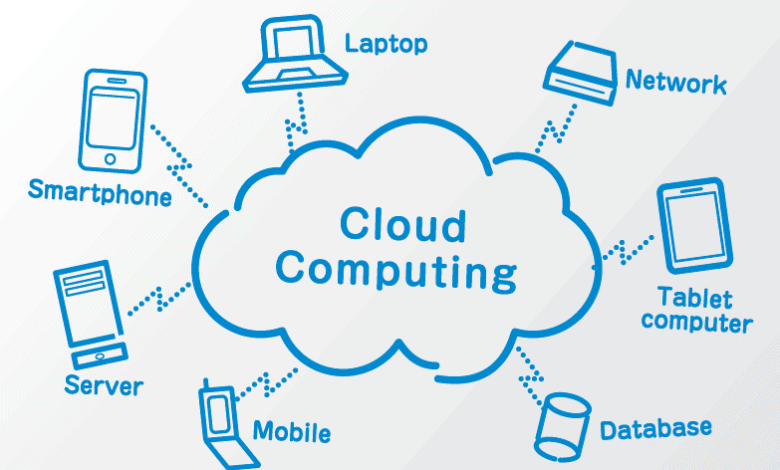The Past, Present, And Future Of Cloud Computing

What is Cloud Computing?
There are two meanings to cloud computing. The far more common is that a commercial service provider’s data center also called the public cloud system runs working loads remote locations over the Web. The well-known notion of cloud computing is demonstrated by common public cloud offers—like the Google Cloud Platform (GCP), Amazon Web Services (AWS), and Microsoft Azure. Most companies today adopt a multi cloud strategy, simply using more than one public cloud.
The second significance of cloud computing is the way it works: a virtualized hub of assets available on request, from unprocessed computing resources to application functionality. If a client provides cloud services, the supplier fulfills those requirements by means of advanced automation instead of manual delivery. The ability to use abstract computing, storage, and network resources to carry out workloads when necessary and tap into a host of pre-constructed services.
The History of Cloud Computing
The idea of resource sharing across a network does not change, even though the term “cloud computing” is thoroughly recent, and dates to the period of computer systems in the 50s, when users can simultaneously access a strong centralized system through several user nodes. Because it was so costly to acquire and maintain computer capacity, share it economically. The theory of virtual machines was born out in the 70s, when several virtual computers were running on a single hardware devices, but that idea was never introduced at an early stage. Rather, the Personal Computer controlled the next three decades.
Later in 2005, companies all over the world understood that cloud is a more economical solution to their data storage problems as it took comparatively lesser time and effort and also offered more capabilities in low cost. They started to buy more and more shared computing resources on the cloud and it expanded the cloud computing market.
Read More: ideas for new careers at 45
What Can Cloud Do for You?
Cloud computing is a paradigm for providing on-demand, self-service, network-independent computational power, locational, fast permeability as well as a pay-per-use investment modell. A Browser like Safari or IE11 or Firefox or Google Chrome is used to obtain most cloud storage, while some companies will offer devoted mobile apps.
E-mail service providers, such as Gmail as well as Office 365 appear to become the most popular services for most companies, no matter small or big. Furthermore, Skype & Zoom seem to be a successful hit for communication and collaboration tools, CRMs such as Salesforce, Zoho, and service providers such as ServiceNow and Zendesk form the lifeblood of any business.
Types of Cloud Computing Services
Almost every major provider of cloud services, such as GCP, Amazon, Alibaba, and Microsoft Azure etc., has categorized their services into 3 groups: IaaS, PaaS, SaaS.
IaaS
Infrastructure-as-a-services includes hardware, storing, and service-like network delivery. For instance, an enterprise can register for and connect directly the hardware, OS, and storage that it requires with cloud providers like GCP, Amazon, and Azure instantly.
PaaS
Platform-as-a-service is provided when the cloud service provider offers many other components, including webserver software and databases.
SaaS
Software-as-a-service, This is the business app in a pay-as-you-use method offered by the cloud service provider, in which a company does not have to fret on what the software is running on.
Leading cloud service providers like Amazon, Microsoft, and Google, for instance, offer maximum data protection in all their product lines. Cloud service providers also include a wide variety of tools as well as services to safeguard your cloud platform and apps. More than anything else that a typical company might afford, the leading cloud providers also have a few great examples of class infrastructure or duplication.
Is Cloud Computing Actually More Secure?
Cyber threats and cyber crimes have become a pretty common thing today. It is easy to paralyze systems which do not have the best security layer and have no adequate backup file system. If Windows programs had been operating in the cloud, most cloud service providers would have offered easy updates and fewer abusers of ransom. With data backup, cloud providers such as Google, Amazon, and Microsoft offer a range of easy solutions including versioning for the protection of data and for ensuring that all their products are secured in the best possible way.
The Future of Cloud
It is already Cloud First in developed nations such as the United States of America or the United Kingdom or Canada. In the federal govt of the USA, the idea of a “Cloud First” approach has distributed over the corporate world since then. Many other organizations already regard the cloud as the very first option for the deployment of a new app or capacity, regardless of size. It transforms that there is nobody who wants to create and maintain an application on their own data centers or servers, so businesses around the world are watching the gains of a pay-as-you-go infrastructure on-demand.
As per Gartner, in 2019, over 30 percent of the top 100 new technology suppliers moved to the cloud and the percentage almost doubled in 2020. We now have a new infrastructure and develop increases with the increase of IoT devices, not only access information but use it in real-time for taking decisions. The enormous amount of data produced needs to be collected and analyzed in the cloud, too. And not only the servers, but also the cloud’s end-points. Also along with AI, cloud is predicted to do wonders
What is the future prophesy for us?
Cloud is the ultimate future and there is no way we can live without virtualization in the modern world. Especially after Covid-19 when everything has become remote, the cloud is inevitable. Not just it makes lives easier by making everything virtually accessible, it is also cost-effective. So, if you are convinced of the benefits of the cloud and want to explore your career on the cloud, we would suggest you enroll in cloud computing certifications and get yourself started.




